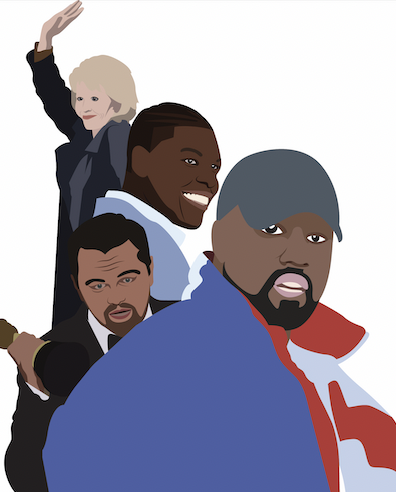Harmful or Helpful? As celebrities take a stand, the line between opinion and fact blurs

Photo illustration by Allie Hall.
January 30, 2023
Increasingly, celebrities are speaking out on their personal political opinions, sparking debate about the role they should play in politics. With worsening societal issues and discrimination, Hollywood stars are taking a stand and spreading awareness.
Actors have a right to share their opinion as much as anyone, but the line between politics and hate speech has become blurry. With more access to large audiences through social media and television, public figures are able to share just about any feeling they have regardless of it being hateful or offensive.
I don’t have any issue with celebrities sharing their opinions.
Whether I agree or not, it isn’t my opinion, and they have freedom of speech just like anyone else. My issue comes when public figures abuse their platforms through purposeful hate speech.
I think it’s beneficial when celebrities utilize their status to spread awareness of issues like climate change or the fight for equal rights. It’s important for their audiences to remember that these beliefs are opinions.
Conducting personal research and developing personal beliefs is vital for every citizen, although some will take opinion as sole truth.
Some stars endorse candidates and mention political views in passing. Others have taken a public stand with protesters to fight inequality and environmental issues.
John Boyega spoke at a protest in London for the Black Lives Matter movement. Jane Fonda has fought against climate change and racial injustice for decades.
Award shows like the Oscars are home to many speeches with political warnings and concerns. Actor Leonardio DiCaprio used his acceptance speech to warn about the dangers of climate change in 2016.
Endorsing candidates and supporting movements is fine, but there’s a difference between supporting stances aimed at building equality and stances aimed at creating more division.
The rapper formerly known as Kanye West (now Ye) showed his support for former President Donald Trump throughout late 2018. He later renounced his endorsement and decided that he wanted to announce his candidacy for the 2020 United States Presidential election.
It’s difficult for me to defend supporters of Trump, as he spreads hatred quite often. Between a multitude of offensive sexual remarks and utilizing racial language, he has created a hateful name for himself.
But the even larger issue with Ye came more recently, when he began to spread antisemitic and white supremacist ideals.
Following a series of antisemitic comments made by Ye, a group of supporters was seen on an overpass with banners saying that West was “right about the Jews” and performing the Nazi salute.
West later shared his admiration for Adolf Hitler in an interview with conspiracy theorist Alex Jones on his radio show by saying he “sees good things in Hitler.”
Additionally, West was seen wearing a shirt with the “White Lives Matter” slogan on the back in 2022, supporting white supremacy and mocking the BLM movement.
It’s very simple to share an opinion without being offensive. Everyone should be allowed a say in politics, but hate speech doesn’t belong anywhere. With audiences as impressionable as they are, it’s vital to spread awareness to create positivity and to build a better future rather than tearing others down for personal gain.
It’s perfectly fine to utilize freedom of speech, but hate speech shouldn’t be protected. It’s very easy to be respectful of others’ social identities while pursuing personal politics. It’s no different for celebrities.
The more exposure to hate, the more likely it is that people will start to pick up on hateful behavior. People are impressionable, especially by those who they admire.
It’s important that platforms with large audiences work to inform, educate and work towards a better future. But it’s equally as important to remember that Hollywood stars are people before they are actors.
We aren’t going to always agree with the opinions of others, but we can use that to build our own beliefs and educate ourselves further.































































































































































